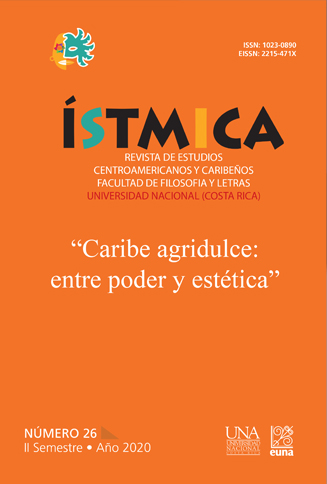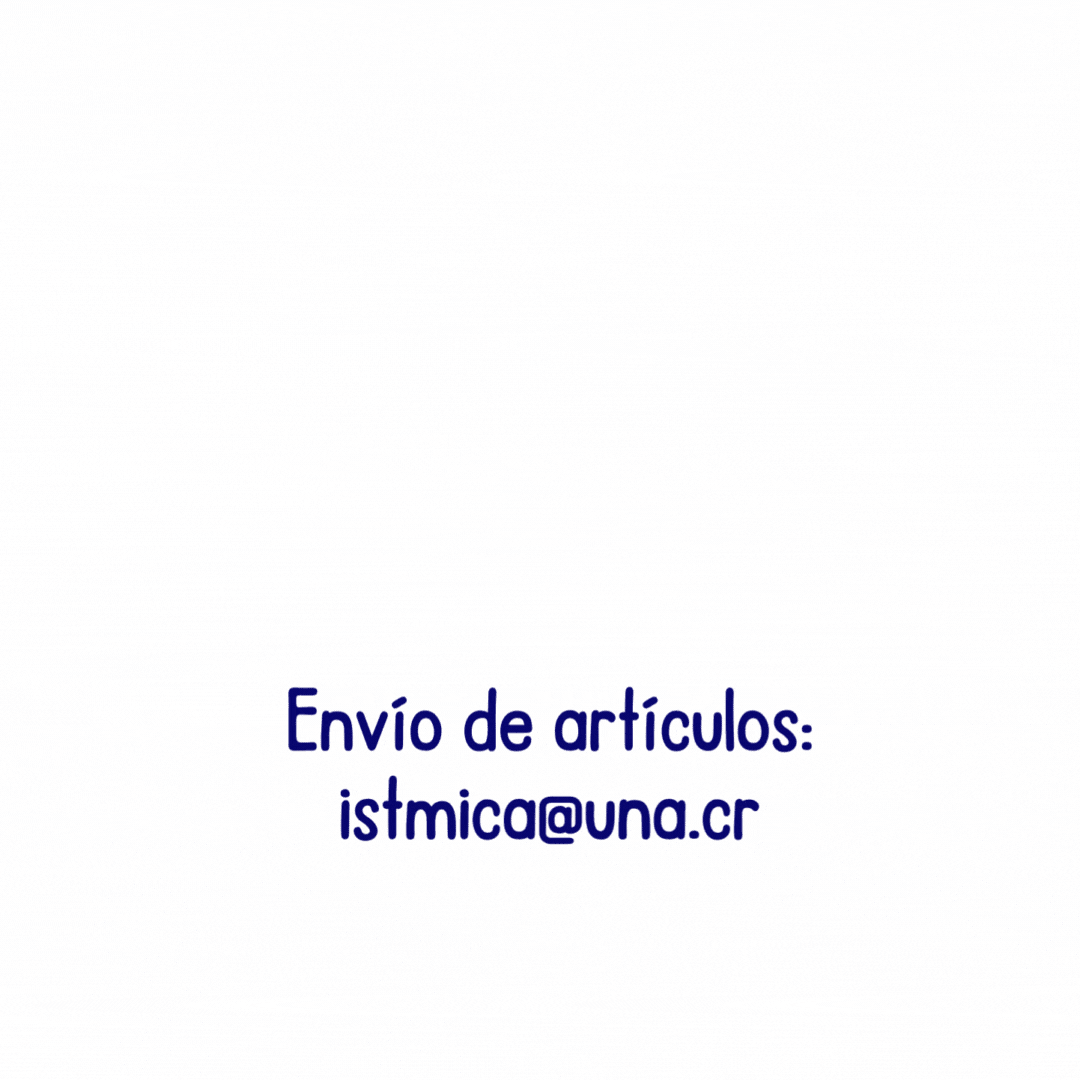Armas de doble filo: el humor en The Fat Black Woman’s Poems y Lazy Thoughts of a Lazy Woman, de Grace Nichols
DOI:
https://doi.org/10.15359/istmica.26.3Palabras clave:
Humor, poesía caribeña, desborde, quiebre, Grace NicholsResumen
El segundo y tercer poemario (The Fat Black Woman’s Poems [1984] y Lazy Thoughts of a Lazy Woman [1989], respectivamente) de Grace Nichols, autora guyanesa residente en el Reino Unido desde 1977, se encuentran hermanados por el uso del humor. Criticada por valerse de este recurso, visto como un exceso de liviandad para tratar temas complejos como el pasado de esclavitud, la dura vida del inmigrante caribeño o la sexualidad femenina, Nichols revindica su utilización en tanto implica su adscripción a la tradición antillana. En el presente trabajo, mediante el análisis de cuatro poemas (dos de cada libro), se explora cómo opera el humor en ambas obras y qué simplificaciones conlleva, poniendo especial énfasis en cómo la aparente liviandad que aporta es, en tanto tradición caribeña, otro modo de resistencia.
Referencias
- Agard, John. 1985. Mangoes & bullets: selected and new poems, 1972-84. Londres: Pluto Press.
- Bajtin, Mijael. 1976. «Carnaval y Literatura.» Revista Eco, n.o 134: 311–338.
- Bringas López, Ana. 2003. «Representations of black omen in Grace Nichol’s poetry: from otherness to empowerment». Revista alicantina de estudios ingleses, n.o 16: 3-19.
- DeCaires Narain, Denise. 2004. Contemporary Caribbean Women’s Poetry: Making Style. Londres, Nueva York: Routledge.
- Donnell, Alison. 2006. Twentieth-century Caribbean literature: critical moments in Anglophone literary history. Londres, Nueva York: Routledge.
- Donnell, Alison y Sarah Lawson Welsh, eds. 1996. The Routledge reader in Caribbean literature. Londres, Nueva York: Routledge.
- Easton, Alison. 1994. «The body as history and ‘writing the body’: The example of Grace Nichols». Journal of Gender Studies 3 (1): 55–67.
- Escudero, Maite. 2000. «Race, Gender and Performance in Grace Nichols’s The Fat Black Woman’s Poems». Journal of International Women’s Studies 1 (2): 12–26. - Firmat, Gustavo Pérez. 1984. «Riddles of the Sphincter: Another Look at the Cuban” Choteo”». Diacritics 14 (4): 67. Glissant, Édouard. 2008. Le discours antillais. Nachdr. Collection Folio Essais 313. Paris: Gallimard.
- Griffin, Gabriele. 1993. «‘Writing the Body’: Reading Joan Riley, Grace Nichols and Ntozake Shange». En Black women’s writing, 19–42. Nueva York: St. Martin’s Press.
- Hammonds, Evelynn M. 1997. «Toward a Genealogy of Black Female Sexuality: The problematic of Silence». En Feminist genealogies, colonial legacies, democratic futures, editado por M. Jacqui Alexander y Chandra Talpade Mohanty, 93-104. Londres, Nueva York: Routledge.
- Harding, Elizabeth Jean. 2007. «Make yourself a (t) Home: Gender, Place, and Identity in the Poetry of Grace Nichols».Tesis doctoral, University of New Brunswick, Department of English.
- Lawson Welsh, Sarah. 2007. Grace Nichols. Writers and Their Work. Tavistock, Devon: Northcote House Publ. Lorde, Audre. 1984. «The Master’s Tools Will Never Dismantle the Master’s House». Sister Outsider, 110-113, Nueva York: Quality Paper Book Club.
- Mañach, Jorge. 1969. Indagación del choteo. Miami: Mnemosyne. Naipaul, V.S. 1970. «Power to the People». New Yorker Review, 9 de marzo. http://library2.nalis.gov.tt/gsdl/collect/news3/index/assoc/HASH0126/ a01f6fc1.dir/doc.pdf.
- Nancy, Jean-Luc. 2003. Corpus. Traducido por Patricio Bulnes. Madrid: Arena Libros.
- Nichols, Grace. 1989. Lazy thoughts of a lazy woman and other poems. Londres: Virago.
- Nichols, Grace. 1992. The fat black woman’s poems. Londres: Virago.
- Nichols, Grace, y Maggie Butcher. 1988. «Grace Nichols in Conversation with Maggie Butcher». Wasafiri 4 (8): 17–19. https://doi. org/10.1080/02690058808574163.
- Ortiz, Fernando. 1963. Contrapunteo cubano del tabaco y el azúcar. La Habana: Consejo Nacional de Cultura.
- Scanlon, Mara. 1998. «The Divine Body in Grace Nichols’s “The Fat Black Woman’s Poems”». World Literature Today 72 (1): 59–66.
- Valdés García, Félix. 2004. «El Caribe: integración, identidad y choteo». Utopía y Praxis Latinoamericana 9 (27): 49–60.
- Wisker, Gina. 2000. Post-colonial and African American women’s writing: a critical introduction. Macmillan International Higher Education.
Publicado
Cómo citar
Número
Sección
Licencia
Las personas autoras que publiquen en esta revista permiten cesión gratuita, exclusiva, de ámbito mundial de sus derechos de autoría a la Universidad Nacional (Costa Rica), conservando únicamente sus derechos morales sobre la obra publicada.
Los artículos pueden ser citados y copiados, citando a la persona autora y la fuente. Todos los artículos publicados en la Revista Ístmica están protegidos bajo una Licencia Creative Commons Atribución-NoComercial-CompartirIgual 4.0 Internacional










